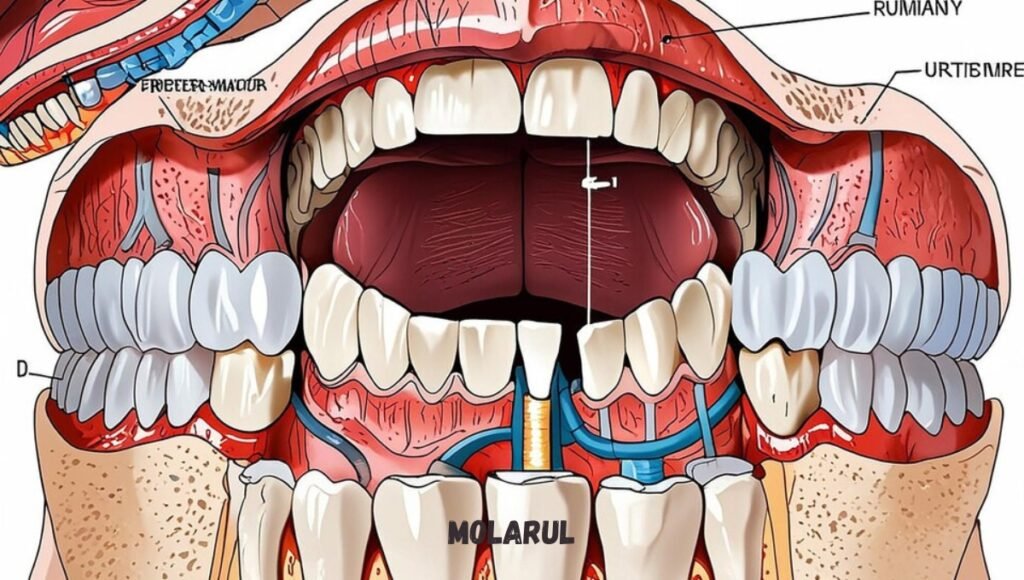Introduction
Molarul, commonly known as molars, are crucial teeth located at the back of the mouth. These large, flat teeth are primarily responsible for grinding food, making them essential for proper digestion. Understanding the role, types, and care of molars can significantly impact your overall dental health. This article delves into what molarul is, its importance, and how to maintain healthy molars throughout your life.
What is Molarul?
Molars, or molarul in some languages, are the large, broad teeth located at the back of the mouth. Humans typically have 12 molars, three on each side of the upper and lower jaws. These teeth are larger than the other types of teeth (incisors, canines, and premolars) and are designed for grinding and breaking down food into smaller, more digestible pieces.
Molars have several key characteristics:
- Broad, Flat Surface: Ideal for grinding and crushing food.
- Multiple Roots: Providing strong anchorage to withstand the pressure of chewing.
- Cusps: Raised points on the surface that help in breaking down food.
Types of Molars
There are three types of molars in the human mouth, each serving a specific function:
- First Molars (Six-Year Molars): These are the first permanent molars to appear, usually around the age of six. They are crucial for maintaining the alignment of the other teeth as the mouth grows.
- Second Molars (Twelve-Year Molars): These usually emerge around the age of twelve. They play a key role in further breaking down food particles.
- Third Molars (Wisdom Teeth): These are the last molars to appear, typically between the ages of 17 and 25. In many cases, wisdom teeth can cause crowding or other dental issues, often leading to their removal.
Importance of Molars in Dental Health
Molars are essential for several reasons:
- Chewing Efficiency: Molars break down food into smaller pieces, making it easier for enzymes in the digestive system to process it.
- Maintaining Jaw Structure: Molars help maintain the shape and alignment of the jaw. Without them, the jawbone can shrink, leading to changes in facial structure.
- Speech: Molars play a role in the articulation of certain sounds, impacting speech clarity.
- Prevention of Overload on Front Teeth: Without molars, the front teeth would bear excessive pressure during chewing, leading to potential damage or wear.
Common Molar Issues
Molars are susceptible to several dental problems due to their location and function:
1. Cavities
Molars are prone to cavities because of their large surface area and the presence of grooves where food particles can get trapped. If not cleaned properly, bacteria can thrive, leading to decay.
2. Gum Disease
Due to their position in the mouth, molars are often harder to clean. This can lead to plaque buildup, which, if not removed, can cause gum disease. Gum disease around the molars can lead to tooth loss if left untreated.
3. Impacted Wisdom Teeth
Wisdom teeth often do not have enough space to emerge properly, leading to impaction. Impacted wisdom teeth can cause pain, swelling, and even infection. In many cases, they need to be surgically removed.
4. Cracks and Fractures
Molars endure a lot of pressure during chewing, making them susceptible to cracks and fractures. These can be caused by biting down on hard objects or due to existing cavities that weaken the tooth structure.
Caring for Your Molars
Maintaining healthy molars is essential for overall dental health. Here are some tips to care for your molars:
1. Regular Brushing
Brush your teeth at least twice a day using fluoride toothpaste. Make sure to reach the molars at the back of your mouth. Use a toothbrush with a small head and soft bristles for better access.
2. Flossing
Floss daily to remove food particles and plaque from between your teeth, especially around the molars, where your toothbrush might not reach.
3. Mouthwash
Using an antiseptic mouthwash can help reduce the bacteria in your mouth and prevent plaque buildup on your molars.
4. Regular Dental Check-ups
Visit your dentist regularly for check-ups and cleanings. Regular dental visits can help detect problems with your molars early, allowing for prompt treatment.
5. Healthy Diet
A diet low in sugary foods and drinks can help prevent cavities. Foods rich in calcium and phosphorus, such as dairy products and leafy greens, can help maintain strong teeth.
6. Dental Sealants
Consider dental sealants for your molars. Sealants are a protective coating applied to the chewing surface of molars to prevent cavities. They are especially recommended for children but can benefit adults as well.
When to See a Dentist
It’s important to see a dentist if you experience any of the following symptoms related to your molars:
- Persistent pain or discomfort in the back of your mouth.
- Swelling around your molars or in the jaw.
- Difficulty chewing or a change in your bite.
- Signs of infection, such as redness, swelling, or pus around a molar.
- A cracked or broken molar.
The Role of Molars in Children
Molars in children, also known as primary molars, play a significant role in their dental development. These molars help maintain space for permanent teeth and contribute to the proper alignment of adult teeth.
Parents should ensure their children’s molars are well cared for by:
- Teaching proper brushing and flossing techniques.
- Scheduling regular dental visits.
- Avoiding sugary snacks and drinks that can lead to cavities.

FAQs About Molarul
1. What is the function of molar teeth?
Molars are primarily responsible for grinding and breaking down food into smaller pieces, aiding in the digestive process.
2. How many molar teeth do adults have?
Adults typically have 12 molars: six in the upper jaw and six in the lower jaw.
3. What are wisdom teeth, and why are they often removed?
Wisdom teeth are the third set of molars that usually appear between ages 17 and 25. They are often removed because they can cause crowding, impaction, or other dental issues.
4. How can I prevent cavities in my molars?
You can prevent cavities by maintaining good oral hygiene, using fluoride toothpaste, flossing daily, and visiting your dentist regularly.
5. Are dental sealants effective for molar protection?
Yes, dental sealants are effective in protecting molars from cavities, especially in children and adolescents.
6. Can molars be replaced if they are lost?
Yes, if a molar is lost, it can be replaced with dental implants, bridges, or dentures, depending on the situation.
7. Why do molars sometimes need to be extracted?
Molars may need to be extracted due to severe decay, gum disease, fractures, or impaction, particularly in the case of wisdom teeth.
Conclusion
Molars, or molarul, are indispensable to your dental health. They play a critical role in chewing, maintaining jaw structure, and overall oral hygiene. Understanding how to care for them and recognizing when issues arise is vital to preserving your dental health. Regular dental visits, proper oral hygiene, and a healthy diet are key to keeping your molars in excellent condition.


